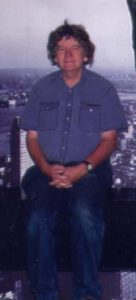
December 17, 2017
He’s Paying Respects, Through the Midwest, and Joshua
Poetry by John Grey
He’s Paying Respects
He no longer mourns the body
six feet below him.
His tears are for the stone
grown grubby with the years,
and shriveled wildflowers
and that willow with a diseased
and dragging branch
for every year she’s been gone.
He’s not quite like the crows though
They celebrate the dead as if it’s life,
sit together on a bough like undertakers,
dark eyes peeled for another corpse to eat.
And nor is he in league
with the old while-bearded man
who drives his mower across the grass
or those two young guys in the distance,
shirtless, wielding spades,
a hole in the world opening up beneath them.
No, he doesn’t show up here
because it’s what he’s paid to do.
Now, he can hardly remember what she looked like.
Her touch has been superseded by everything
from the flannel of pajamas
to a laminated table-lop.
Her perfume is now coffee.
Her conversation, the television set.
He does grieve for the angel,
twenty years about to fly
and never once soaring.
And the marble bench,
lovingly dedicated
but too uncomfortable to sit on.
And there’s always himself to bewail, lament:
shackled by duty, beholden to tears,
buried alive
and in the open air of all places.
Through the Midwest
Is anything different?
It doesn’t look like it,
Hammond Grove really is
just Eliot Hills by another name.
Same main street.
Same stores.
Same cluster of houses.
No wonder
my straight line
behaves like a circle.
The farther I travel
the more I get the feeling
that I passed this way
twenty times today already.
At least it’s growing dark now.
So there is a difference
between Springvale at sunset
and Collinsford with the street lights on.
But not much of a one.
These are small towns.
Civic pride counts
but not as much as comfort.
And comfort may have many fathers
but they all think the same.
t’s the quest for something different
that’s the orphan.
At least, in an hour or two,
I’ll be in the city,
indulging myself in
conflict and camaraderie,
excitement and fear.
I’m right at home where
there is no hominess.
Joshua
People are always going on about
how Joshua once broke a man’s nose
over nothing more than an unpaid
oil and filter change.
And they’re always bringing up that time,
when he was eleven or so,
when he tried to stab his father in the chest
with a bread knife,
but only managed to slice the palm
of the old man’s right hand.
The man that Joshua hit
was in his front lawn,
cutting his grass.
Without saying a word,
he just swung a haymaker and connected.
While Joshua’s mother rushed
her husband off to the hospital
with his wound bandaged in a good white shin,
Joshua retired to his room,
turned on the radio,
flopped on his bed
and stared blissfully at the ceiling.
As the man’s wife ran out to help him,
Joshua turned, didn’t look back,
got into his car and drove home.
He plunked himself down on the couch,
flicked the lid of a Budweiser,
sat back to watch the Steelers’ game.
Joshua has always been easy to anger.
Joshua has always known how to relax.
In between, he’s a conversation piece.

Write City Ezine is currently closed to submissions. See submission guidelines for further information.
Affiliates/Partners
Testimonials
Contact
Join CWA
Member Profile
My Account
Writers Conference
Presenters
Agents and Publishers
Pitch Sessions
Sponsors
Scholarships
Speaker Registration
Book of the Year
Spirit Award
First Chapter Contest
Resources
Home
Chicago Writers Association
info@chicagowrites.org
Make a Difference!

